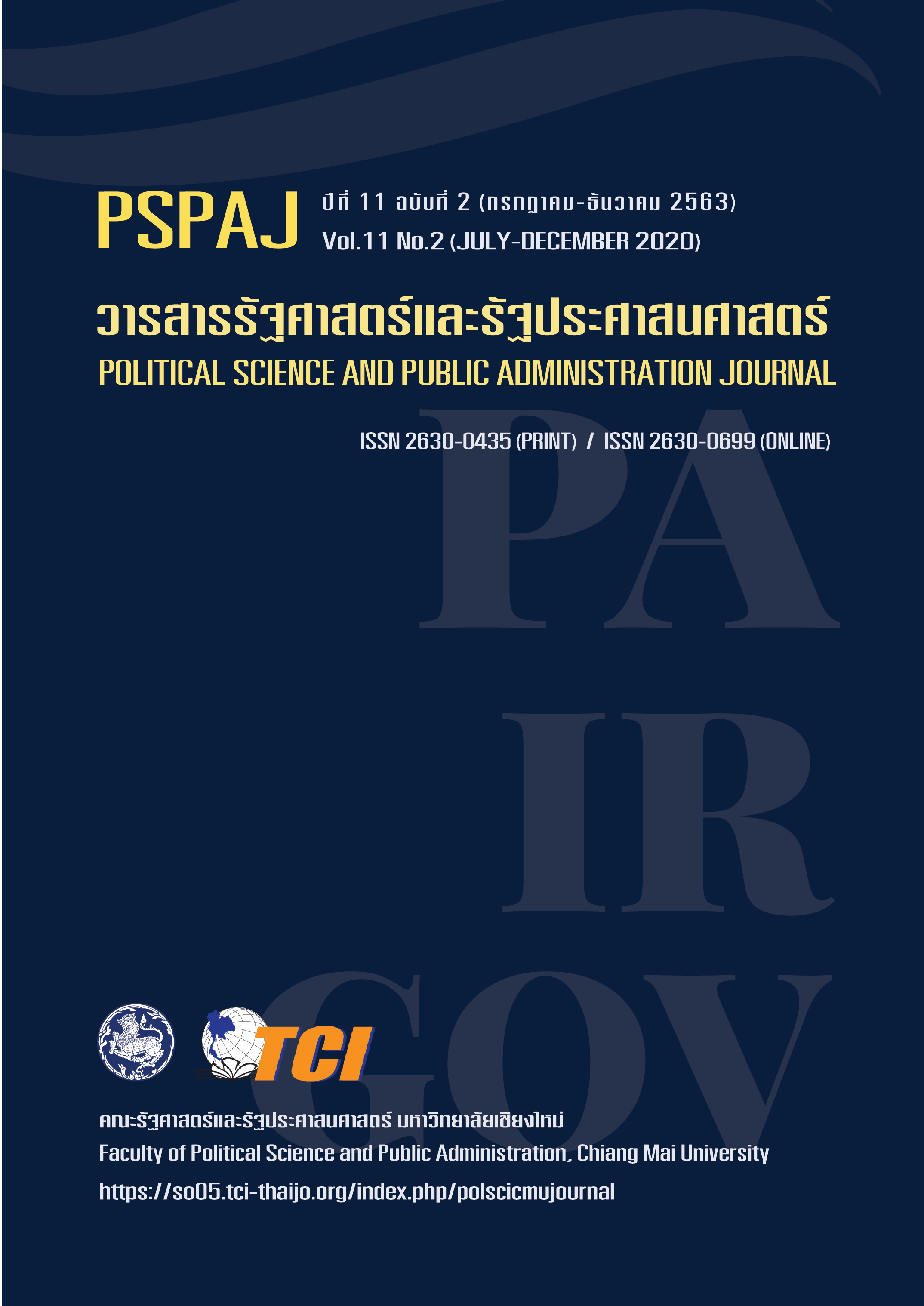ทฤษฎีการตีความ: ขนบธรรมเนียม เรื่องเล่า และอิทธิพลของความเชื่อในกิจการสาธารณะ
Main Article Content
บทคัดย่อ
งานชิ้นนี้มีจุดมุ่งหมายที่จะแนะนำแนวคิดเรื่อง “ทฤษฎีการตีความ” สำหรับการศึกษา “การบริหารความร่วมมือกิจการสาธารณะ” โดยทฤษฎีการตีความนั้นให้ความสำคัญกับเรื่อง ความคิด ความหมาย ความเชื่อ และการกระทำ ที่มีอิทธิพลและส่งผลอย่างสำคัญต่อการทำงานของรัฐบาล แนวคิดนี้พยายามจะชูเรื่อง “ความเชื่อ” ในการทำความเข้าใจและเพื่อทำให้เห็นรูปแบบการทำงานของรัฐที่เปลี่ยนไปตามหลัก “การบริหารความร่วมมือกิจการสาธารณะ” ในแง่นี้งานชิ้นนี้จะพิจารณาภววิทยาของแนวคิดดังกล่าวผ่านพื้นฐานความคิดว่าด้วยตัวกระทำการเฉพาะ ภาคปฏิบัติการ และอำนาจของการกำหนดเขตการกระทำ อันเป็นพื้นฐานความเข้าใจเบื้องต้นของ “ทฤษฎีการตีความ” ในส่วนถัดมาผู้เขียนจะพิจารณาวิธีวิทยาในการเก็บข้อมูลเมื่อเราต้องการใช้ทฤษฎีดังกล่าวนี้ในการศึกษาในทางบริหารรัฐกิจ ในส่วนต่อไปจะเป็นการยกตัวอย่างงานที่ใช้ทฤษฎีในการศึกษาเพื่อเป็นแนวทางที่จะนำมาใช้ต่อไป และส่วนสุดท้ายผู้เขียนจะพิจารณาความเป็นไปได้ และข้อเสนอแนะที่จะนำทฤษฎีมาใช้ศึกษาในกิจการสาธารณะไทยต่อไป
Downloads
Article Details
- เนื้อหาและข้อมูลที่ลงตีพิมพ์ในวารสารรัฐศาสตร์และรัฐประศาสนศาสตร์ถือเป็นข้อคิดเห็นและความรับผิดชอบของผู้เขียนบทความโดยตรง ซึ่งกองบรรณาธิการวารสารรัฐศาสตร์และรัฐประศาสนศาสตร์ ไม่จำเป็นต้องเห็นด้วย หรือร่วมรับผิดชอบใดๆ
- บทความและข้อมูล ที่ได้รับการตีพิมพ์ในวารสารรัฐศาสตร์และรัฐประศาสนศาสตร์ ถือเป็นลิขสิทธิ์ของวารสาร หากบุคคลหรือหน่วยงานใดต้องการนำข้อมูลไปใช้ประโยชน์ในทางวิชาการ ขอให้อ้างอิงแหล่งที่มาด้วย
เอกสารอ้างอิง
วสันต์ เหลืองประภัสร์, และชาย ไชยชิต. (2561). “การอภิบาล” (Governance) ในฐานะมโนทัศน์ทางการบริหารรัฐกิจ. รัฐศาสตร์สาร, 39(3), 140-199.
อัมพร ธำรงลักษณ์. (2556). การบริหารปกครองสาธารณะ: การบริหารรัฐกิจในศตวรรษที่ 21. ใน อัมพร ธำรงลักษณ์. (บก.) การบริหารปกครองสาธารณะ: การบริหารรัฐกิจในศตวรรษที่ 21. (น. 1-34). กรุงเทพฯ: โครงการตำราและสิ่งพิมพ์ คณะรัฐศาสตร์ มหาวิทยาลัยธรรมศาสตร์.
Bevir, M. (2010). Democratic governance. Princeton: Princeton University Press.
______. (2011a). Interpretative Theory. In Mark Bevir. (Ed.). The SAGE handbook of governance. (pp. 51-64) New Delhi: SAGE.
______. (2011b). The Stateless State. In Bevir, M. (Ed.). The SAGE Handbook of governance. (pp. 203-217). New Delhi: SAGE.
Bevir, M., & Rhodes, R. A. W. (2003a). Interpreting British Governance. London: Routledge.
______. (2003b). Searching for Civil Society: Changing Patterns of Governance in Britain. Public Administration, 81(1), 41–62.
______. (2006). Governance Stories. Oxon: Routledge.
______. (2010). The State as Cultural Practice. Oxford: Oxford University Press.
______. (2016). Interpretive Political Science: Mapping the Field. In Bevir, M. & Rhodes, R. A. W. (Eds.). Routledge Handbook of Interpretive Political Science. (pp. 3-27). Oxon: Routledge.
Bevir, M., & Weller, P. (2003a). Comparative Governance: Prospects and Lessons. Public Administration, 81(1), 191–210.
______. (2003b). Traditions of Governance: Interpreting the Changing Role of the Public Sector. Public Administration, 81(1), 1–17.
Bingham, L. B. (2011). Collaborative Governance. In. Bevir, M. (Ed.) The SAGE Handbook of Governance. (pp. 386-401). London: SAGE Publications.
Christensen, T. (2003). Narratives of Norwegian Governance: Elaborating the Strong State Tradition. Public Administration, 81(1), 163–190.
Denhardt, J. V., & Denhardt, R. B. (2011). Leadership. In Bevir, M. (Ed.) The SAGE Handbook of Governance. (pp. 419-435). London: SAGE Publications.
Elgie, R. (2003). Governance Traditions and Narratives of Public Sector Reform in Contemporary France. Public Administration, 81(1), 141–162.
Jann, W. (2003). State, Administration and Governance in Germany: Competing Traditions and Dominant Narratives. Public Administration, 81(1), 95–118.
Kickert, W. J. M. (2003). Beneath Consensual Corporatism: Traditions of Governance in the Netherlands. Public Administration, 81(1), 119–140.
Stillman II, R. J. (2003). Twenty–first Century United States Governance: Statecraft as Reform Craft and the Peculiar Governing Paradox It Perpetuates. Public Administration, 81(1), 19–40.
Wanna, J., & Weller, P. (2003). Traditions of Australian Governance. Public Administration, 81(1), 63–94.


